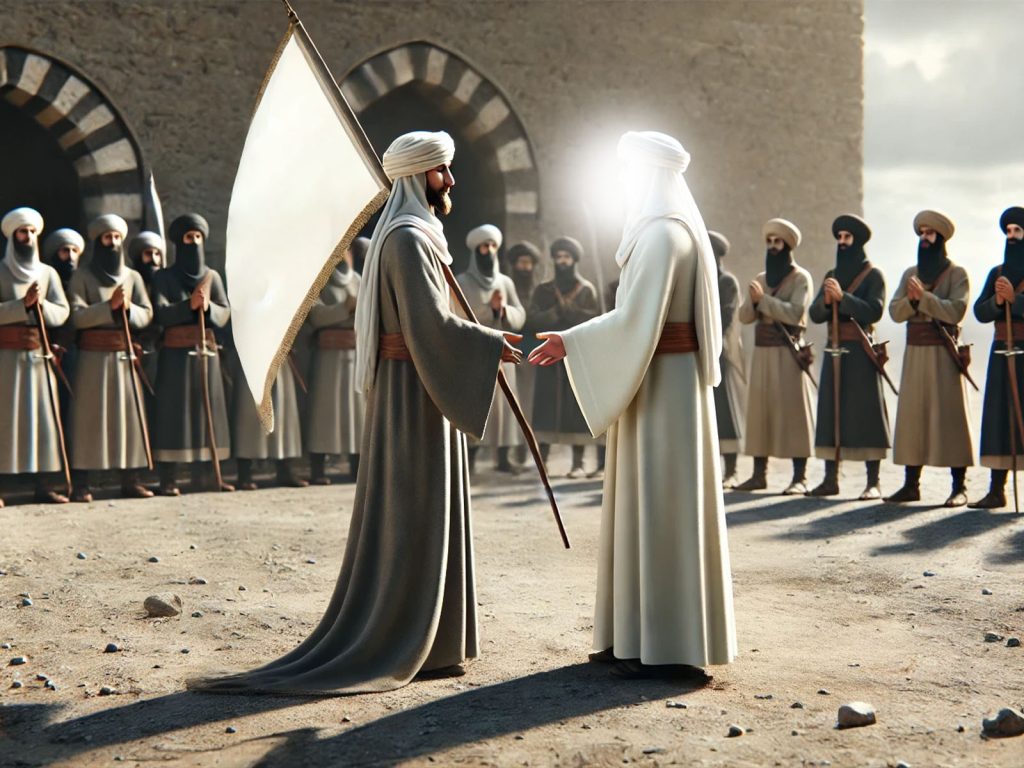Prophet Muhammad (PBUH&HP) worried about the future of his Ummah because he knew that the Muslim nation is on the verge of seditions and chaos. He was especially worried about the few around him hidden amongst the Muslims. The Prophet feared a return of the nation to the past, namely the tribal traditions and ignorant Arab racism, which he had fought so hard to remove during his mission.
Despite the sensitivity of the situation, and before his illness, Prophet Muhammad (PBUH&HP) had decided to dispatch a great army to an outlying land. On the second day of his illness, he chose “Usama the son of Zeid” as chief commander[1] and ordered his companions, especially those more known, to join the army’s young commander in his mission to Balgha in Damascus.
After equipping the army, the Holy Prophet (PBUH&HP) ordered Usama and his army to leave Medina immediately, [2] and emphasized his disapproval for those that disobeyed the orders as people that fell far from God’s mercy[3]. The choosing of a young commander to lead the elders is a decision worthy of analysis from all angles. For one, the prophet had fell ill, and another was that among the elders were chief commanders, companions, and noblemen who considered themselves more valuable than the young commander.
Nonetheless, despite of Prophet’s (PBUH&HP) emphasis, reprimand and command to follow orders, some Muslims refused to join the army [4] and falsified the situation. The group of Muslims who objected to the commanding officer would not have done so if they had truly learnt the teachings of Islam, and understood that the Great Prophet (PBUH&HP) does not speak of his own will [5]. They should not have contradicted the Prophet (PBUH&HP). But how could the Prophet have cleared Medina from its elders and noblemen, when he had become aware of the much sedition that would occur after his demise?
Of course, all of these actions were done in order to clarify an important affair. The following points can be obtained from Great Prophet’s (PBUH&HP) decision:
First, The Holy Prophet was preparing his community for understanding the concept of allocating the responsibility of rule based on virtue and ability, and not on the basis of fame and old age. Usama’s case was made to teach and prepare the people for the leadership and Wilayah of Ali (PBUH), a man younger than many noblemen.
Second, Prophet Muhammad (PBUH&HP) was aware of their ill intentions, and by ordering them to join Usama’s army, wanted to send away those men who had devised a plan for usurping the Caliphate during the chaos and confusion. While, Ali (PBUH) and his close companions were asked to remain and not join the army[6].
The group that stayed behind and did not join the army did so to hijack the caliphate by staying in Medina and spreading rumors about the Prophet’s (PBUH&HP) martyrdom.
Third, Prophet Muhammad (PBUH&HP) wanted to show to all and those who had plans to hijack the caliphate that they are not fit to rule the entire Muslim Ummah when they themselves have been commanded to obey a young commander.
In sum, as the demise of Prophet Muhammad (PBUH&HP) was approaching, he was worried about the events that were to follow. His dispatching of an army with Usama, as its commander, was one of his final strategies to establish Ali ibn Abi Talib (PBUH) as his successor. However, those intended, disobeyed the Great Prophet (PBUH&HP) and refused to join Usama’s army. They were the ones who played a major role in that which happened in Medina after the Demise of the Great Prophet (PBUH&HP).
(Selection taken from The incident of Saqifah by Allamah MuhammadReza Mozafar translated by Gholamreza Saeidi (with some changes))
Tags: Arab racism – Province of Amir al-Mominin A.S – the Holy Prophet – The Last Strategy
Footnotes:
[1] Dispatching Usama’s army has been mentioned in many Sunni’s historical references:
Al-Sirah al- Halabiah, vol. 3, p. 227; Al-Tabaghat al-Kobra, Vol.2, p.90; Tarikh Madinah Damishq, vol. 2, p. 55; Omdah al-Ghaari fi Sharh Sahih al-Bukhari, vol. 18, p. 76
[2] Tarikh al-Islam al-kabir by al- Dhahabi, vol, 3, p. 19 and History of the Caliphs by Suyuti, p. 82
[3] Al-Melal va Nehal by Shahrestani, vol.1, p.129; Al-Mavaghef by Jorjani, vol.8, p.619
[4] Fath al-Baari fi Sharh Sahih al-Bukhari, vol. 8, p. 115; Al-Sirah al- Halabiah, vol. 3, p. 227
[5] Nor does he speak of (his own) desire. (The Holy Quran, (53:3))
[6] There are several evidences which show that despite of ordering the companions to join the Usama’s army, Prophet Muhammad’s (PBUH&HP) made an exception for Amir al-Mu’minin (PBUH) to stay in Medina.



